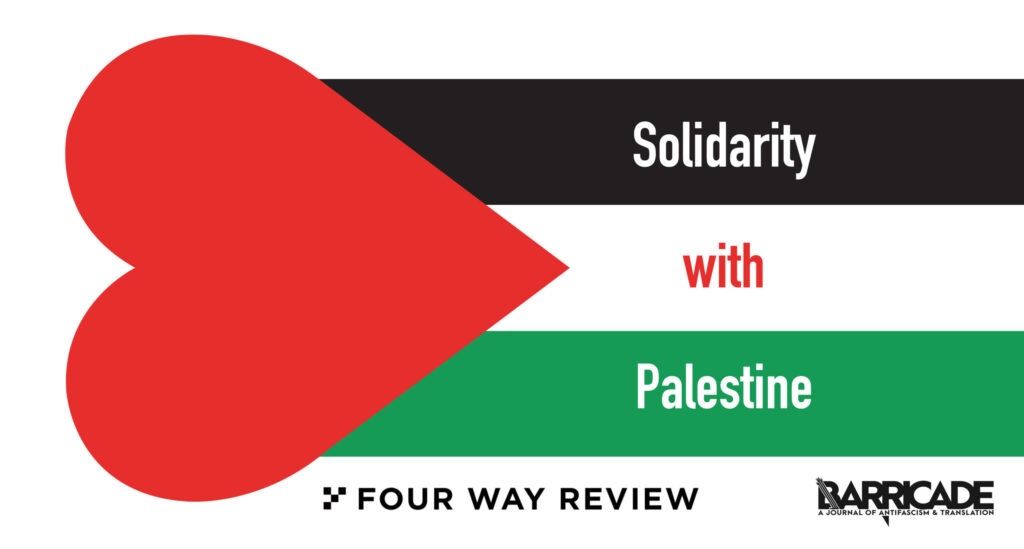Syllabus for a Reading Group for Archival Liberation in and beyond Palestine
by J.J. Ghaddar & James Lowry1
In speaking of a “documentary nakba,” we are likewise speaking of the physical, social, political and cultural ills that accrue from a sustained campaign of theft and destruction by Israeli belligerents of records . . .
João Melo’s poem “Urgent: News of the Death of Hiba Abu Nada” illuminates that moment between the act and the narration of the act, in which forces conspire to distort, deny, and erase; to establish discursive control. As archivists, scholars of the archive, we know that problem well. Historically, the destruction of records, the theft of cultural property, the denigration of languages, memory practices and epistemologies have been key tools of colonialism, and we are seeing those same tactics in use in Palestine today. Accompanying the massacres of Palestinians, the cultural dimension of genocide is also at work: European settlers adopt nativized names, they speak a resurrected language in place of their European tongues, and as the texts listed in this syllabus attest, they steal, obfuscate, and destroy the archives that tell the history of Palestine and its people.
When Constantin Zurayk used the term “nakba” to describe the Zionist horrors of 1948, he was speaking expansively of a catastrophe that was physical, social, political, and cultural. 2 In speaking of a “documentary nakba,” we are likewise speaking of the physical, social, political and cultural ills that accrue from a sustained campaign of theft and destruction by Israeli belligerents of records, with all their historical and juridical force, and other artifacts of culture with all of their affordances.
It is with an understanding of the powerful work that culture does in the project of genocide that we offer a syllabus for the study of the Palestinian archive under Zionist aggression. Scholars, students, activists, archivists, and others are meeting to study these texts together between February and May 2024. We study the Palestinian archive to perpetuate it: Zionist ambitions will not be fully realized if the knowledge in these texts—the knowledge of what has been lost, documented in these texts—is repeated from one of us to another.
This is no substitute for action against the bloodshed, but the texts listed here inform such action and impel us to it.
The basis of unity for our reading group is the 2023 Statement on Gaza issued by Librarians and Archivists for Palestine, and endorsed by the Middle East Librarians Association and other organizations. The readings have been selected from the Librarians and Archivists with Palestine archive syllabus, Under Pressure: Representation, Information, and The Archive in Palestine (n.d.) and the annotated bibliography, On the Systematic Destruction, Plunder, Theft and Erasure of Palestinian Archives, Libraries & Cultural Heritage by the Israeli State through its National Archives, Library, Heritage, Military & Educational Systems (January 2, 2024) compiled by Dr. Jamila J. Ghaddar, Mariam Kariam, and Lisa Nussey for the International Council on Archives.
The texts in our syllabus trace the physical, discursive, and epistemological violence suffered by the Palestinians and their documentary heritage. Taken together, they reveal the relationships between the archive, the land, and the supremacist settler colonial logic that have bloodied our screens since 8th October 2023, and Western hands since the inception of Zionism in 19th century Europe and the founding of the Zionist state in 1948.
With this reading group, we invite you to:
- read, study, cite and teach these texts
- if approaching this syllabus without historical or political context, to read the texts in consultation with Salman H. Abu-Sitta’s Atlas of Palestine or alongside Richard Becker’s Palestine, Israel, and the U.S. Empire, or Ilan Pappé’s The Ethnic Cleansing of Palestine.
- to develop discussion prompts for each text, and share them here
- and to keep reading, studying, citing and teaching these texts until liberation is achieved.
Barricade is working in collaboration with Four Way Review to uplift Palestinian voices and projects in solidarity with the Palestinian cause. View the rest of our Solidarity with Palestine series here and Four Way Review‘s publication here. View more details on the series and our call for contributions here.

- DR. JAMILA GHADDAR is a Lebanese feminist, archivist, writer, historian and educator. Currently, she is Assistant Professor at Dalhousie University’s Department of Information Science, and founding director of the Archives & Digital Media Lab. Previously, Ghaddar was a Library & Archival Fellow at the Jafet Library at the American University of Beirut where she archived the personal papers of the Arab intellectual credited with coining the term “Nakba”, Dr. Constantine Zurayk.
DR. JAMES LOWRY is Associate Professor in information studies at the City University of New York. He is convener of the Archival Discourses international research network, which is interrogating the Western archival canon, and with Dr. Sumayya Ahmed he co-edits the Routledge Studies in Archives book series.Lowry is the editor of the anthologies Displaced Archives (2017) and Disputed Archival Heritage (2022), both published by Routledge.
- Zurayk, Constantine. 1948. Maʻná al-nakbah (Beirut: Dār al-‘ilm lil- malāyyn) [Arabic]. The following is an English translation: Zurayk, Constantine. 1956/1948. The meaning of the disaster (Khayat’s College Book Cooperative).

